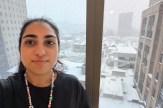Q&A: ‘We’re here for the long haul’ — Provost David Madigan on the university in turbulent times

It has been three months since the Trump administration began making sweeping federal funding and policy changes that impact higher education.
Provost David Madigan sat down with Joanna Weiss, a special contributor to Northeastern Global News, for a wide-ranging conversation about what the university is doing to mitigate the impact.
The conversation has been edited for clarity and brevity.
In the past three months, we’ve seen a barrage of orders and policies coming from Washington, many of them targeted directly at higher education. How is this affecting Northeastern’s mission?
Some of the challenges we’re facing at the moment are certainly unprecedented.
However, we’re here for the long haul. Our core mission — of educating learners and discovering new knowledge — will still be intact ten years from now, 20 years from now, 100 years from now. So we’re focused on how we stay true to that mission, how we maximize the impact of our teaching and experiential learning opportunities, and how we grow our research enterprise so that we can solve more problems that are of importance to the world?
One way is that we hold to our values of academic freedom: We do not interfere with what faculty teach and how they teach it. Faculty have a diverse range of opinions. That’s what makes the university a special place. These are the core values we will protect.

On a day-to-day basis, what is university leadership doing in response to every new order, proclamation, or policy that comes down?
There are groups across our campus network that are meeting on a daily basis and working on these issues around the clock. We have a strong team in Washington. We have teams working closely with state and city governments, as well. We’re trying to influence in ways that might not be entirely visible. But rest assured that we are doing everything we can to advocate for our interests and protect our community.
We’re also working very closely with other universities because, at a moment like this, there is absolutely strength in numbers. In an organized fashion, groups of universities — the Boston universities, the American Council on Education, etc. — can speak with a strong voice.
The university’s public FAQ is updated frequently with real-time information about the impacts and the university’s response. I encourage everyone to read it.
Will that include filing and joining lawsuits against the administration?
We are ready, willing and able to engage in litigation to protect our core interests. We will do so at moments in time when we think it can actually be effective.
Across the country, some international students and faculty have seen their visas revoked. Northeastern has the second largest international student population in the United States, and some of our students have been affected. How is the university responding?
First and foremost, we want to do right by our international students. They’re part of the infrastructure and the DNA of the university. They bring so much to our classrooms and our campuses. We want to make them feel as welcome as possible and we want them to thrive. So we’re trying to offer as much practical help as we can.
We have 24,000-plus international students in our midst. A few dozen have been affected by this so far. We’re working with each of those students individually through the Office of Global Services. We’ve identified legal resources they can reach out to independently. Support may include allowing students to continue their studies remotely or at one of Northeastern’s international campuses in the UK or Canada.
What should members of the Northeastern community do if they encounter an immigration officer on campus, or believe their immigration status is in jeopardy?
We’ve established a Global Safety Operations Center hotline, staffed 24/7, at 617-373-1234. Any student, faculty, or staff member approached by an immigration agent should call that number. For less urgent matters, the Office of the General Counsel has set up an email address at OGCimmigration@northeastern.edu. We hope people take advantage of these resources.
Many communities across our campuses — from the international community to the transgender community — are feeling particularly vulnerable right now in response to policy moves out of Washington. What is the university doing to support them?
There are many conversations going on across the university, and we are continuing to reach out to various groups who feel threatened at this time. We’ve set up resources, including some of the hotlines and services I just mentioned. And we’re doing everything we can to influence the government. I am particularly aware of the concerns of our transgender community. We will do everything we can to ensure their safety and their ability to be productive, thriving members of our university.
It’s important to remember that we have university policies that prohibit discrimination and harassment of any kind. We absolutely will enforce those rules. There are state laws — and, actually, federal laws — that we will invoke to seek protection for vulnerable members of our community should they need it.
Our FAQ also includes a robust list of resources and updated information. We encourage people to keep checking that page, as changes are frequent and marked by a time stamp.
Editor’s Picks
The Trump administration has rescinded millions of dollars of research grants across the country through NIH and other agencies, and has suggested some drastic policy changes around research funding. How is that affecting Northeastern?
Some of those decisions are facing legal challenges, and we’re following those cases closely. As of now, we’ve experienced some grant terminations —about 14 grants from a pool of about 900. In most cases, we have the right to appeal. And where it makes sense, we will vigorously appeal termination decisions and pursue our legal options, but we will obey the law at all times.
As faculty consider new grants to pursue, is there anything they should be doing differently?
Faculty should do what they always do, which is respond to calls for proposals. We have research agendas across the entire university and we are pursuing those. We are working hard in D.C. to protect the budgets of agencies like the National Science Foundation, the Department of Energy, the Department of Defense, and the National Institutes of Health.
At the same time, it’s always been the case that we adapt to what the funding opportunities are. That includes opening up new paths for research funding, such as a focus on philanthropy and foundations as potential sources.
We also have the advantage of being a global university. We are set up both in London and in Dublin to go after European Union funding — one of the largest pots of research funding in the world — and there are other sources of funding that we can go after in that context. Our network science faculty in London recently were awarded a highly prestigious EU grant. I very much hope it’s the first of many. Faculty members who would like to know more about this and pursue this should get in touch with me.
There’s a lot of uncertainty here. What effect will that have on the university’s budget and its financial health?
Uncertainty with regard to the economy is a bad thing. It makes it very difficult for enterprises like ours, but also for manufacturing companies and service companies and so on. That said, we’ve come through previous challenges like this very well. In 2008 and 2009, when the world economy was in free fall, we found a way to grow and expand, and came out of that crisis stronger than we were going into it. The same happened with COVID. So at this time, we have to be extremely prudent in terms of how we manage the university’s budget. But I am very confident that we will do what’s deep in our DNA here: find a way to take advantage of this moment to make the university stronger and double down on our core mission.
Higher education is under tremendous scrutiny, and some are questioning its value and impact. What is important to emphasize?
This is the ideal moment to reaffirm the value of higher education, and to show the powerful impact of universities like Northeastern. We are actively showcasing the work of our faculty, including groundbreaking research in health, security and sustainability. And our students and alumni exemplify the value of our experiential learning model.











